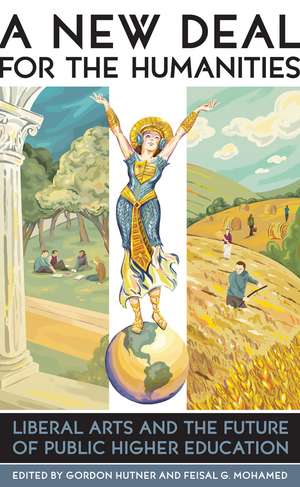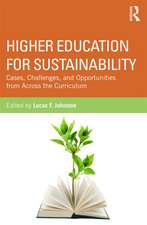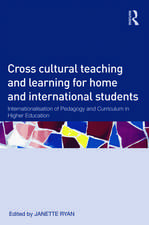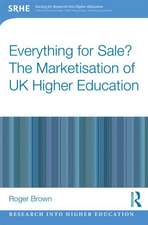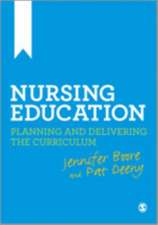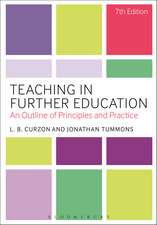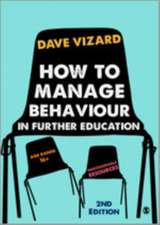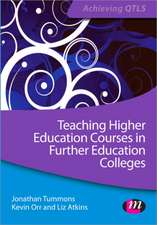A New Deal for the Humanities: Liberal Arts and the Future of Public Higher Education: The American Campus
Editat de Gordon Hutner, Feisal G. Mohamed Contribuţii de Roger L. Geiger, Sheldon Rothblatt, Kathleen Woodward, Yolanda Moses, Daniel Lee Kleinman, CHARLOTTE MELIN, Bethany Nowviskie, John McGowan, Jeffrey J. Williams, Christopher Newfielden Limba Engleză Paperback – 11 noi 2015
Many in higher education fear that the humanities are facing a crisis. But even if the rhetoric about “crisis” is overblown, humanities departments do face increasing pressure from administrators, politicians, parents, and students. In A New Deal for the Humanities, Gordon Hutner and Feisal G. Mohamed bring together twelve prominent scholars who address the history, the present state, and the future direction of the humanities. These scholars keep the focus on public higher education, for it is in our state schools that the liberal arts are taught to the greatest numbers and where their neglect would be most damaging for the nation.
The contributors offer spirited and thought-provoking debates on a diverse range of topics. For instance, they deplore the push by administrations to narrow learning into quantifiable outcomes as well as the demands of state governments for more practical, usable training. Indeed, for those who suggest that a college education should be “practical”—that it should lean toward the sciences and engineering, where the high-paying jobs are—this book points out that while a few nations produce as many technicians as the United States does, America is still renowned worldwide for its innovation and creativity, skills taught most effectively in the humanities. Most importantly, the essays in this collection examine ways to make the humanities even more effective, such as offering a broader array of options than the traditional major/minor scheme, options that combine a student’s professional and intellectual interests, like the new medical humanities programs.
A democracy can only be as energetic as the minds of its citizens, and the questions fundamental to the humanities are also fundamental to a thoughtful life. A New Deal for the Humanities takes an intrepid step in making the humanities—and our citizens—even stronger in the future.
The contributors offer spirited and thought-provoking debates on a diverse range of topics. For instance, they deplore the push by administrations to narrow learning into quantifiable outcomes as well as the demands of state governments for more practical, usable training. Indeed, for those who suggest that a college education should be “practical”—that it should lean toward the sciences and engineering, where the high-paying jobs are—this book points out that while a few nations produce as many technicians as the United States does, America is still renowned worldwide for its innovation and creativity, skills taught most effectively in the humanities. Most importantly, the essays in this collection examine ways to make the humanities even more effective, such as offering a broader array of options than the traditional major/minor scheme, options that combine a student’s professional and intellectual interests, like the new medical humanities programs.
A democracy can only be as energetic as the minds of its citizens, and the questions fundamental to the humanities are also fundamental to a thoughtful life. A New Deal for the Humanities takes an intrepid step in making the humanities—and our citizens—even stronger in the future.
| Toate formatele și edițiile | Preț | Express |
|---|---|---|
| Paperback (1) | 286.30 lei 6-8 săpt. | |
| Rutgers University Press – 11 noi 2015 | 286.30 lei 6-8 săpt. | |
| Hardback (1) | 825.88 lei 6-8 săpt. | |
| Rutgers University Press – 11 noi 2015 | 825.88 lei 6-8 săpt. |
Din seria The American Campus
-
 Preț: 263.76 lei
Preț: 263.76 lei -
 Preț: 168.53 lei
Preț: 168.53 lei -
 Preț: 229.36 lei
Preț: 229.36 lei -
 Preț: 342.76 lei
Preț: 342.76 lei - 27%
 Preț: 827.55 lei
Preț: 827.55 lei - 27%
 Preț: 825.88 lei
Preț: 825.88 lei - 18%
 Preț: 340.32 lei
Preț: 340.32 lei - 51%
 Preț: 499.54 lei
Preț: 499.54 lei - 10%
 Preț: 909.27 lei
Preț: 909.27 lei -
 Preț: 321.56 lei
Preț: 321.56 lei -
 Preț: 294.11 lei
Preț: 294.11 lei -
 Preț: 360.14 lei
Preț: 360.14 lei -
 Preț: 266.10 lei
Preț: 266.10 lei -
 Preț: 305.25 lei
Preț: 305.25 lei -
 Preț: 257.75 lei
Preț: 257.75 lei -
 Preț: 264.19 lei
Preț: 264.19 lei -
 Preț: 204.88 lei
Preț: 204.88 lei
Preț: 286.30 lei
Nou
Puncte Express: 429
Preț estimativ în valută:
54.80€ • 56.98$ • 45.85£
54.80€ • 56.98$ • 45.85£
Carte tipărită la comandă
Livrare economică 15-29 martie
Preluare comenzi: 021 569.72.76
Specificații
ISBN-13: 9780813573236
ISBN-10: 0813573238
Pagini: 210
Ilustrații: 2 graphs, 7 tables
Dimensiuni: 152 x 229 x 18 mm
Greutate: 0.31 kg
Ediția:None
Editura: Rutgers University Press
Colecția Rutgers University Press
Seria The American Campus
ISBN-10: 0813573238
Pagini: 210
Ilustrații: 2 graphs, 7 tables
Dimensiuni: 152 x 229 x 18 mm
Greutate: 0.31 kg
Ediția:None
Editura: Rutgers University Press
Colecția Rutgers University Press
Seria The American Campus
Notă biografică
GORDON HUTNER is a professor of English at the University of Illinois at Urbana-Champaign. He is the author of several books, including What America Read: Taste, Class, and the Novel, 1920–1960.
FEISAL G. MOHAMED is a professor of English at the CUNY Graduate Center in New York. A past president of the Milton Society of America, his latest book is Milton and the Post-Secular Present: Ethics, Politics, Terrorism.
FEISAL G. MOHAMED is a professor of English at the CUNY Graduate Center in New York. A past president of the Milton Society of America, his latest book is Milton and the Post-Secular Present: Ethics, Politics, Terrorism.
Cuprins
Acknowledgments
Introduction
Gordon Hutner and Feisal G. Mohamed
1. From the Land-Grant Tradition to the Current Crisis in the Humanities
Roger L. Geiger
2. Old Wine in New Bottles, or New Wine in Old Bottles? The Humanities and Liberal Education in Today’s Universities
Sheldon Rothblatt
3. We Are All Nontraditional Learners Now: Community Colleges, Long-Life Learning, and Problem-Solving Humanities
Kathleen Woodward
4. Humanities and Inclusion: A Twenty-First-Century Land-Grant University Tradition
Yolanda T. Moses
5. Sticking Up for Liberal Arts and Humanities Education: Governance, Leadership, and Fiscal Crisis
Daniel Lee Kleinman
6. Speaking the Languages of the Humanities
Charlotte Melin
7. Graduate Training for a Digital and Public Humanities
Bethany Nowviskie
8. Can the Humanities Save Medicine, and Vice Versa?
John McGowan
9. The Need for Critical University Studies
Jeffrey J. Williams
10. What Are the Humanities For? Rebuilding the Public University
Christopher Newfield
Afterword
Gordon Hutner and Feisal G. Mohamed
Notes on Contributors
Index
Introduction
Gordon Hutner and Feisal G. Mohamed
1. From the Land-Grant Tradition to the Current Crisis in the Humanities
Roger L. Geiger
2. Old Wine in New Bottles, or New Wine in Old Bottles? The Humanities and Liberal Education in Today’s Universities
Sheldon Rothblatt
3. We Are All Nontraditional Learners Now: Community Colleges, Long-Life Learning, and Problem-Solving Humanities
Kathleen Woodward
4. Humanities and Inclusion: A Twenty-First-Century Land-Grant University Tradition
Yolanda T. Moses
5. Sticking Up for Liberal Arts and Humanities Education: Governance, Leadership, and Fiscal Crisis
Daniel Lee Kleinman
6. Speaking the Languages of the Humanities
Charlotte Melin
7. Graduate Training for a Digital and Public Humanities
Bethany Nowviskie
8. Can the Humanities Save Medicine, and Vice Versa?
John McGowan
9. The Need for Critical University Studies
Jeffrey J. Williams
10. What Are the Humanities For? Rebuilding the Public University
Christopher Newfield
Afterword
Gordon Hutner and Feisal G. Mohamed
Notes on Contributors
Index
Recenzii
"Hutner and Mohamed offer ten essays about changing views of a liberal arts philosophy in public institutions of higher education … The essays are all by respected and experienced scholars, among them Jeffrey Williams (Carnegie Mellon), Yolanda Moses (Univ. of California, Riverside), and Christopher Newfield (Univ. of California, Santa Barbara) ... Summing up: Recommended. Graduate students, researchers, faculty, and professionals."
“This book is an important companion and corrective to recent work. The cases made in these valuable essays are varied, subtle, and provocative, and affirm that nothing could be more important than to invest our public dollars in the humanities crucible of effective citizenry and global awareness.”
Descriere
A New Deal for the Humanities brings together twelve prominent scholars who shed light on the many concerns swirling around the humanities today—exploring the history of the liberal arts in America, their present state, and their future direction. The volume focuses on public higher education, for it is in our state schools that the liberal arts are taught to the greatest numbers, where the decline of those fields would be most damaging, and where their strength is most threatened.
